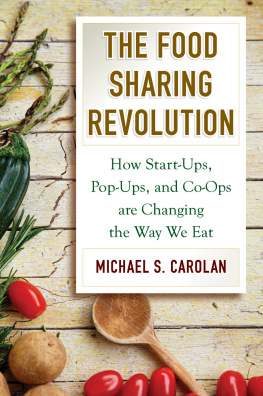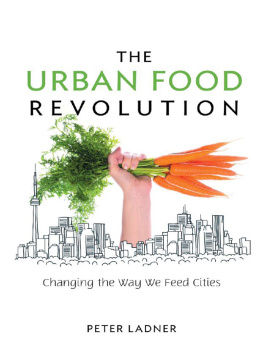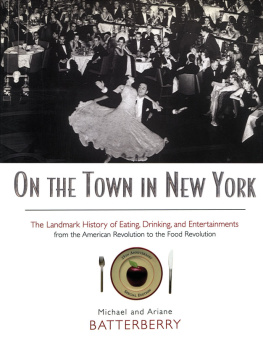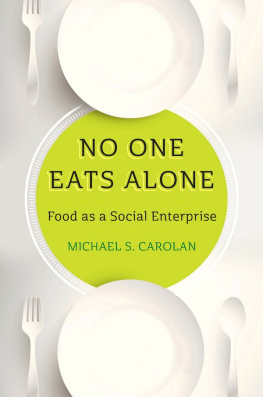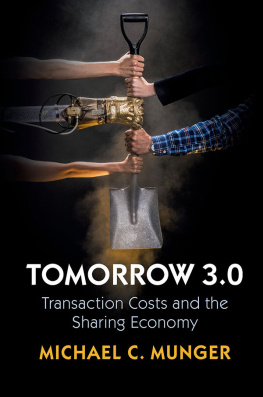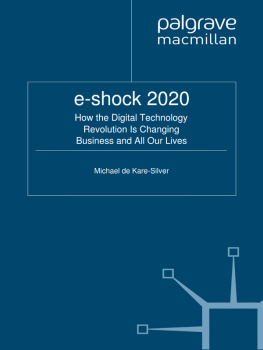Michael S. Carolan - The Food Sharing Revolution: How Start-Ups, Pop-Ups, and Co-Ops are Changing the Way We Eat
Here you can read online Michael S. Carolan - The Food Sharing Revolution: How Start-Ups, Pop-Ups, and Co-Ops are Changing the Way We Eat full text of the book (entire story) in english for free. Download pdf and epub, get meaning, cover and reviews about this ebook. year: 2018, publisher: Island Press, genre: Detective and thriller. Description of the work, (preface) as well as reviews are available. Best literature library LitArk.com created for fans of good reading and offers a wide selection of genres:
Romance novel
Science fiction
Adventure
Detective
Science
History
Home and family
Prose
Art
Politics
Computer
Non-fiction
Religion
Business
Children
Humor
Choose a favorite category and find really read worthwhile books. Enjoy immersion in the world of imagination, feel the emotions of the characters or learn something new for yourself, make an fascinating discovery.
- Book:The Food Sharing Revolution: How Start-Ups, Pop-Ups, and Co-Ops are Changing the Way We Eat
- Author:
- Publisher:Island Press
- Genre:
- Year:2018
- Rating:5 / 5
- Favourites:Add to favourites
- Your mark:
- 100
- 1
- 2
- 3
- 4
- 5
The Food Sharing Revolution: How Start-Ups, Pop-Ups, and Co-Ops are Changing the Way We Eat: summary, description and annotation
We offer to read an annotation, description, summary or preface (depends on what the author of the book "The Food Sharing Revolution: How Start-Ups, Pop-Ups, and Co-Ops are Changing the Way We Eat" wrote himself). If you haven't found the necessary information about the book — write in the comments, we will try to find it.
The Food Sharing Revolution: How Start-Ups, Pop-Ups, and Co-Ops are Changing the Way We Eat — read online for free the complete book (whole text) full work
Below is the text of the book, divided by pages. System saving the place of the last page read, allows you to conveniently read the book "The Food Sharing Revolution: How Start-Ups, Pop-Ups, and Co-Ops are Changing the Way We Eat" online for free, without having to search again every time where you left off. Put a bookmark, and you can go to the page where you finished reading at any time.
Font size:
Interval:
Bookmark:
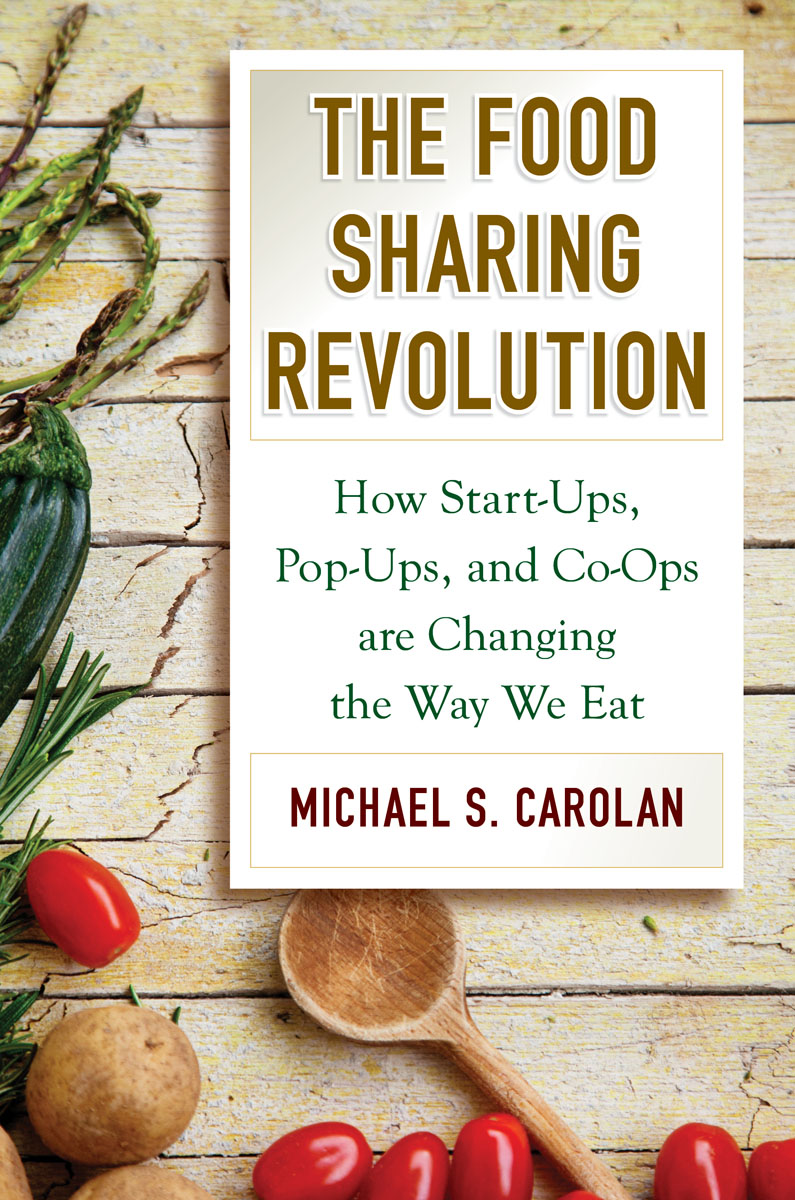
About Island Press
Since 1984, the nonprofit organization Island Press has been stimulating, shaping, and communicating ideas that are essential for solving environmental problems worldwide. With more than 1,000 titles in print and some 30 new releases each year, we are the nations leading publisher on environmental issues. We identify innovative thinkers and emerging trends in the environmental field. We work with world-renowned experts and authors to develop cross-disciplinary solutions to environmental challenges.
Island Press designs and executes educational campaigns, in conjunction with our authors, to communicate their critical messages in print, in person, and online using the latest technologies, innovative programs, and the media. Our goal is to reach targeted audiencesscientists, policy makers, environmental advocates, urban planners, the media, and concerned citizenswith information that can be used to create the framework for long-term ecological health and human well-being.
Island Press gratefully acknowledges major support from The Bobolink Foundation, Caldera Foundation, The Curtis and Edith Munson Foundation, The Forrest C. and Frances H. Lattner Foundation, The JPB Foundation, The Kresge Foundation, The Summit Charitable Foundation, Inc., and many other generous organizations and individuals.
The opinions expressed in this book are those of the author(s) and do not necessarily reflect the views of our supporters.

Island Press mission is to provide the best ideas and information to those seeking to understand and protect the environment and create solutions to its complex problems. Click here to get our newsletter for the latest news on authors, events, and free book giveaways. Get our app for Android and iOS .

Copyright 2018 Michael S. Carolan
All rights reserved under International and Pan-American Copyright Conventions. No part of this book may be reproduced in any form or by any means without permission in writing from the publisher: Island Press, 2000 M Street, NW, Suite 650, Washington, DC 20036.
ISLAND PRESS is a trademark of the Center for Resource Economics.
Library of Congress Control Number: 2018941933
All Island Press books are printed on environmentally responsible materials.
Manufactured in the United States of America
10 9 8 7 6 5 4 3 2 1
Keywords: collaborative consumption, platform cooperativism, food sovereignty, food justice, co-op, community supported agriculture (CSA), agribusiness, sustainable agriculture, Uber, Airbnb.
Airports are curious places. People coming and going, nameless faces attached to rushing bodiesrushing, often, so they can be among the first to wait. I was having one of these waits recently at Denver International Airport when I heard my name and felt a hand placed on my arm. I turned, saw a thin arm, and followed it down to a bony wrist, out of which sprang bluish veins beneath papery skin. I looked up and recognized the face that peered back at me. It belonged to someone whom I had interviewed for this book. The manuscript had been written, at least a first draft, so I was able to outline its contents while we waited together, making sure to repeatedly thank her for her earlier willingness to be interviewed.
Most of what I know, I know because people have been incredibly generous with their time. As I like to tell people, I earned my real degree interviewing people, after getting my PhD.
I wish I could express personally my gratitude, punctuated with a handshake or hug, to everyone who gave to this project. Thanks to everyone who donated their time to be interviewed for The Food Sharing Revolution. Time is precious; I realize that. I hope I have respected that gift by accurately recounting your stories.
I owe no less gratitude to Emily Turner. I continue to learn by the grace of your experience and writing wisdom.
Who I am, and why Im interested in food, can be traced directly to my parents and to my very small town (350 people strong!) upbringing. Food and agriculture are issues that have been deeply personal for me for as long as I can remember. Mom and Dad: thanks for that.
Nora, Elena, and Joey. For you, this project meant numerous nights away from Dad and days of Mom having to do the parenting of two. This is really one of those situations where words of thanks just dont do justice. So: thanks. And also: sorry, as I realize I cant give you those lost hours back. I might have been away, but you were always with me.
I also want to thank the following institutions and professional networks that supported this project in their own unique ways: Colorado State University (United States); Korea University (Korea); the Australasian Agri-Food Research Network; Otago University (New Zealand); the University of Auckland (New Zealand), the University of Toronto (Canada), and the Toronto Food Policy Council (Canada).
Parts of this project were supported by the National Institute of Food and Agriculture (grant number COL00725) and by the National Research Foundation of Korea (NRF-2016S1A3A2924243).
You know its hot when you can see it. Standing alongside a field just off Route 2 in Massachusetts, I was mesmerized by the heat rising off the road, blurring the horizon far in the distance. The bright midday sun beat down on the top of my head. The thermometer in my rental, a midsize whose air-conditioning made more noise than cold air, read 103.
I was driving to meet Josh, a first-generation dairy farmer on his thousand-plus acres of land. We almost had to cancel because of the heat. Not because Josh was cowed by the triple-digit weather but because one of his giant barn fansa lifesaver on hot daysneeded immediate attention. He managed to get the fan fixed in short order, telling me something about how it needed a new belt. Fortunately, he had plenty in reserve.
I wanted to connect with Josh because his enterprise is an anomaly compared with others in the state. Hes in his early fortiesa young pup in a profession with an average age approaching sixty. And when we talked, he had roughly five years of experience under his belt. The percentage of farms in the United States operated by individuals who have been in the profession less than a decade has been in decline for decades. The figure is now around 20 percent, down from close to 40 percent in 1982.
Josh remarked at one point during our interview, with a tone that sounded both incredulous and profoundly sad, Within another ten years the average farmer is going to be eligible for MedicareMedicare. Josh mentioned land prices repeatedly as he tried to explain why hes the exception and not the rule. In Massachusetts, farmland sells for an average of $10,400 per acre. In its push to support new farmers, the U.S. Department of Agriculture lends them up to $300,000 to get started, sufficient for a couple dozen acres of land or a new tractor. Its not nearly enough, Josh flatly told me.
Josh was lucky, by his own admission, and grateful. While he was telling me how he made it, his face lit up with an ear-to-ear grin, bright even in the blazing sun. Josh doesnt own his land, his seeds, or even all of his equipment. And the cows: not his, either. His business model rests on a mix of sharing and cooperative arrangements. Propertys a burden, he explained, adding, Through sharing, I have more control over my life and business. This remarkable statement, which stands opposed to principles that lie at the core of American democracy, got me thinking.
Next pageFont size:
Interval:
Bookmark:
Similar books «The Food Sharing Revolution: How Start-Ups, Pop-Ups, and Co-Ops are Changing the Way We Eat»
Look at similar books to The Food Sharing Revolution: How Start-Ups, Pop-Ups, and Co-Ops are Changing the Way We Eat. We have selected literature similar in name and meaning in the hope of providing readers with more options to find new, interesting, not yet read works.
Discussion, reviews of the book The Food Sharing Revolution: How Start-Ups, Pop-Ups, and Co-Ops are Changing the Way We Eat and just readers' own opinions. Leave your comments, write what you think about the work, its meaning or the main characters. Specify what exactly you liked and what you didn't like, and why you think so.

